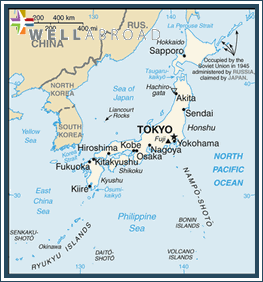|
MOST RECENT ALERTS
There's no recent alert.
|

|
|||||||||||||||
| COUNTRY OVERVIEW | ||||||||||||||||
|---|---|---|---|---|---|---|---|---|---|---|---|---|---|---|---|---|
|
| COUNTRY GENERAL INFORMATION | |||||||
|---|---|---|---|---|---|---|---|
| Language: |
Japanese |
||||||
| Currency: | Japanes Yen (JPY) | ||||||
| Predominant Religions: |
observe both Shinto and Buddhist 84%, other 16% (including Christian 0.7%). |
||||||
| National Holidays: | Birthday of Emperor AKIHITO, 23 December (1933) | ||||||
| Economic Status: |
Japan is stable, highly developed parliamentary democracy with a modern economy. |
||||||
| Security: |
Ground Self-Defense Force (Army), Maritime Self-Defense Force (Navy), Air Self-Defense Force (Air Force), Coast Guard |
||||||
| US Presence: |
U.S. Consulate in Nagoya
Nagoya International Center Bldg. 6F 1-47-1 Nagono, Nakamura-ku, Nagoya 450-0001 Phone: 052-581-4501 U.S. Consulate in Naha
U.S. Consulate General Naha 2-1-1 Toyama, Urasoe City, Okinawa Phone: 098-876-4211 U.S. Consulate General in Sapporo
Kita 1-jo Nishi 28-chome, Chuo-ku Sapporo 064-0821, Japan Phone: 011-641-1115 |
||||||
| Document Requirements: |
A valid passport and an onward/return ticket are required for tourist/business "visa free" stays of up to 90 days. Passports must be valid for the intended period of stay in Japan. Americans cannot work on a 90-day "visa free" entry. As a general rule, "visa free" entry status may not be changed to another visa status without departing and then re-entering Japan with the appropriate visa such as a spouse, work or study visa. |
||||||
| Major Airports: |
Airports: 174, Airports w/paved runways: 143 |
||||||
| Servicing Airlines: |
|
||||||
| Risks and Precautions: |
There have been no major terrorist incidents in Japan since 1995; however, since terrorists can strike at any time and at any place, US citizens should be aware of the potential risks and take these into consideration when making travel plans. The security situation in Japan remains the same with no new credible threat information. Our offices in Japan disseminate threat information through our nationwide email warden system and post current threat information on the US Embassy’s American Citizens Services (ACS) web site at http://japan.usembassy.gov/acs. Anyone may sign up for our emailed warden system messages through our web site. Crimes against US citizens in Japan usually only involve personal disputes, theft or vandalism. The general crime rate in Japan is at levels well below the US national average. Violent crime is rare, but does exist. |
||||||
| Mortality Statistics: |
Infant MR total: 3.28 deaths/1,000 live births Life expectancy at birth: TOTAL 81.04yrs (male 77.74 / 84.51). |
||||||
| Immunization Indicators: |
Required: None Recommended: Hep B, Japanese Encephalitis |
||||||
| Infectious Disease Concerns: |
Japanese encephalitis is found in wide areas of Japan. A measles outbreak was reported in Japan in 2007. |
||||||
| Overall Quality of Medical Services: |
While medical care in Japan is good, English-speaking physicians and medical facilities that cater to Americans' expectations are expensive and not very widespread. Japan has a national health insurance system, which is available only to foreigners with long-term visas for Japan. Medical caregivers in Japan require payment in full at the time of treatment or concrete proof of ability to pay before treating a foreigner who is not a member of the national health insurance plan. |
||||||
| Providers in Network: |
|
||||||
| Recent Medical Threats/ Concerns/Warnings: |
A measles outbreak was reported in Japan in 2007. Highly pathogenic avian influenza (H5N1) was also found in bird populations in Japan in 2003-2004. It continues to cause outbreaks in domestic and wild bird populations and has caused human cases in several East Asian countries. Avoid all direct contact with birds, including domestic poultry (such as chickens and ducks) and wild birds, and avoid places such as poultry farms and bird markets where live birds are raised or kept. |
||||||
| Communications Info: |
Country Calling Code: +81 |
||||||






